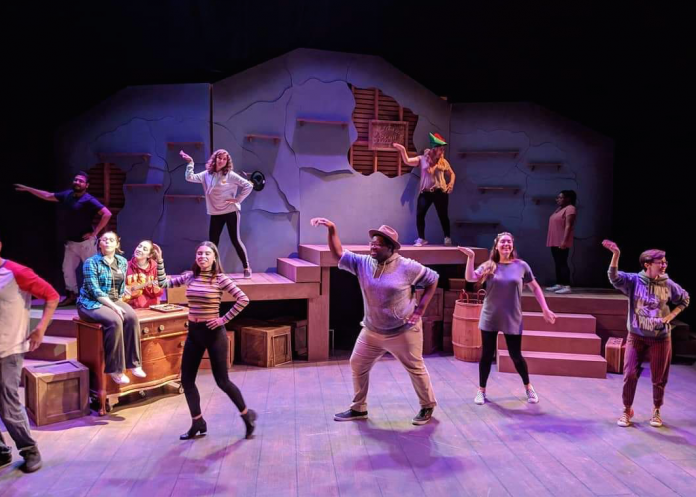“A Fail clock,” so the company’s mantra goes, “is a working clock.” The Fails hit the ground running behind this motto after their immigration to Chicago from Eastern Europe, eventually gaining some notoriety as clocksmiths; their three daughters will inherit the business, but the trio is conflicted over the plans they’ve carved out for their workaday lives.
Soon enough, it won’t matter, as the girls will traverse the heavens far before their times. One dies of blunt-force trauma; another succumbs to the vengeance of the briny deep; and the third falls prey to consumption (this is 1928, and “consumption” was the handle for what we know as TB).
The problem is that only one character (it’s not any of the girls) stands any chance of growth in Philip Dawkins’ lukewarm, colossally overwritten “Failure: A Love Story,” Grossmont College Theatre’s final entry of its 2018-19 season.
While the performances and production values are fine, Dawkins has spent way too little time imagining their overall applications — and here, it shows.
We’ll start with Mortimer Mortimer, a smooth-talking investor who manages to fall in love with each girl in turn. Their deaths, of course, leave him crestfallen and likely single for the rest of his days — meanwhile, there’s lots of subtext about boats, clocks, a snake in an infant’s hand, a spontaneous abortion and a couple of lost parrots, but in no way does any of it amount to support of the story. Mort is left to wallow in his grief while Dawkins sets the subtext adrift in passages as verbose as they are unconnected.
Dawkins has drawn the girls quite disparately, so as to illustrate they have minds of their own — but that’s about the extent of his efforts at characterization. Nelly, the cheery, indefatigable old soul; Jenny June, the irrepressible wannabe world-class swimmer who’s hot for Johnny Weissmuller; Gerty, Fail’s nose-to-the-grindstone de facto CEO: Each has her role to evolve, but thanks to the playwright, each never gets the chance. As disparate as each girl may be individually, her interrelationships reveal a deadly sameness of face, one that makes it hard to justify Morty’s love for any or all.
That means that this story pretty much belongs to Mortimer — and happily, Jeruel Canda delivers. His character evolves with each stroke, inviting us to imagine the cruelties that have toughened him to the horrors that befell each girl. Elaina Covert’s Gerty, Alexa Wolfe’s Jenny June and Adelaida Martinez’s Nelly physicalize their roles nicely, with director Brian Rickel having perfectly cast Wolfe to type.
John N. Fail, a would-be vet who probably gets on better with animals than people, has a savant quality that enlivens the understory (not to mention Mortimer’s character), and we have actor James Allen to thank.
The eight-member chorus is used in the appropriate ancient Greek tradition, mustering understories all the while. Even so, it has its logistical problems — much of this play is narrative, rendering the scene-making (like the passages the choristers introduce) illustrative at best.
There’s some pretty good music at the show’s foundations, especially if you like Leo Friedman and Beth Whitson’s “Let Me Call You Sweetheart,” from 1910. Again, Dawkins sells this aspect short — “Sweetheart” is an absolutely perfect tone-setter here, and for as often as it repeats, it’d be nice to hear all of it.
There’s method to the madness behind Michael McKeon’s effective set design — its collapsible features make utter sense as the show reaches its climax, with the rest of the tech effort following suit.
This play calls itself a love story, and it correctly illustrates that love always entails loss. But there’s loss, and then there’s the scar tissue it leaves behind. Dawkins not only short-shrifts the scar; he doesn’t have much regard for the incisions that caused it. A nicely executed script, after all, doesn’t mean the playwright knows what he’s doing.
This review is based on the matinee performance of May 11. “Failure: A Love Story” runs through May 18 at Grossmont College’s Stagehouse Theatre, 8800 Grossmont College Drive in El Cajon. $10-$15. (619) 644-7234, grossmont.edu.














